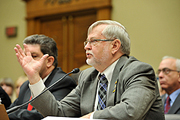News
US postal workers right to bargain attacked by Congress Committee

At an unprecedented hearing of the United States Congress Oversight and Government Reform Committee, Republicans and Democrats engaged in a sometimes fiery discussion over the tentative agreement recently negotiated between the American Postal Workers Union and the Postal Service. Witnesses at the hearing included two members of the Postal Board of Governors, APWU President Cliff Guffey, and Postmaster General Pat Donahoe.
With governors and state legislatures across the country chipping away at the rights of teachers, nurses, and firefighters to engage in collective bargaining, the committee’s decision to examine the APWU’s proposed contract took on an ominous tone.
The two sides hardly could have adopted more different approaches to the issue. The Democratic Representatives were defending collective bargaining, the USPS and its workers for, as Ranking Minority Member Elijah Cummings noted, “dedication” no matter what the conditions. The Republicans criticized the pay raises and the no layoff clause, and added that the Postal Service has far too many employees.
Republican Chairman Darryl Issa (CA) called the APWU negotiations a "missed opportunity" and said it “falls short with some provisions going in the wrong direction” in relation to the financial burdens faced by the Postal Service. In response, Ranking Democrat Elijah Cummings (MD) said that the Committee should “allow workers (to vote) without undo interference
The Chair of the postal subcommittee, Rep. Dennis Ross (R-FL), stated that the Postal Service was “fundamentally broken,” in his view. The workforce costs are “disproportionate,” he added, complaining about labor occupying nearly 80% of operating costs. Cummings pointed out that the Postal Service is a labor-intensive operation. Furthermore, he said, the Oversight Committee’s own personnel costs were 87% of its budget.
US Postmaster General Pat Donahoe and Board of Governors Chair Louis J. Giuliano were clear: Congress caused the financial problems of the USPS in 2006 when it mandated that the Postal Service pre-fund future retiree healthcare payments at such an excessive rate that it pushed the agency toward insolvency. They added that if Congress left the USPS finances alone, there would be no need for these hearings. They also pushed for five-day delivery, which the NPMHU opposes. Giuliano said the contract was “the best achievable under current law.”
Clearly, the Republican majority on the panel had an agenda: To change the law that governs postal bargaining in order to strengthen management’s position and weaken postal unions.
Postmaster General Patrick Donahoe defended management’s decision to sign-off on the tentative agreement, as did Louis J. Guiliano, chairman of the USPS Board of Governors. But every time a congressman criticized the proposed contract, management’s explanation was the same: “This was the best we could get under current law.” Republicans on the panel also took swipes at the “current law.”
APWU President Cliff Guffey gave a vigorous defense of collective bargaining and postal employees.
The APWU approached the labor negotiations with one primary test in mind, Guffey said: “What will be right for the Postal Service, the American people it serves, and the employees we represent? It is a testament to the value of collective bargaining that the APWU and the Postal Service have reached a Tentative Agreement that meets this test.”
President of the National Association of Letter Carriers (NALC) Fred Rolando said “What we saw in the hearing was nothing short of a kangaroo court. We thought that Congress had gotten out of the business of interfering with the collective-bargaining agreements of government workers, but it turns out that some clearly want back in. Keeping politics out of postal bargaining has served the parties, the American people and the mailing public very well for 40 years – we have decent jobs, the mailers get high-quality service at very affordable rates and the taxpayers don’t have to foot the bill.”
“I am stunned that the Congress would interfere in a postal union’s collective bargaining,” said National Postal Mail Handlers (NPMHU) National President Hegarty. “Even worse, the ballots have not yet been returned by the membership. If these Members of Congress were more aware about how collective bargaining works, they would understand why this was a terrible precedent. It smacks of the attacks on unions and workers in Wisconsin, Ohio and elsewhere,” he added.
For APWU reaction to the hearing see: http://apwu.org/news/nsb/2011/nsb05-110405-house-hearing.htm
For NPMHU reaction to the hearing see: http://www.npmhu.org/Pubs/UPDATE/2011/up110402.asp
For NALC Reaction to the hearing see: http://www.nalc.org/news/latest/2011-04-07_oversight.html

